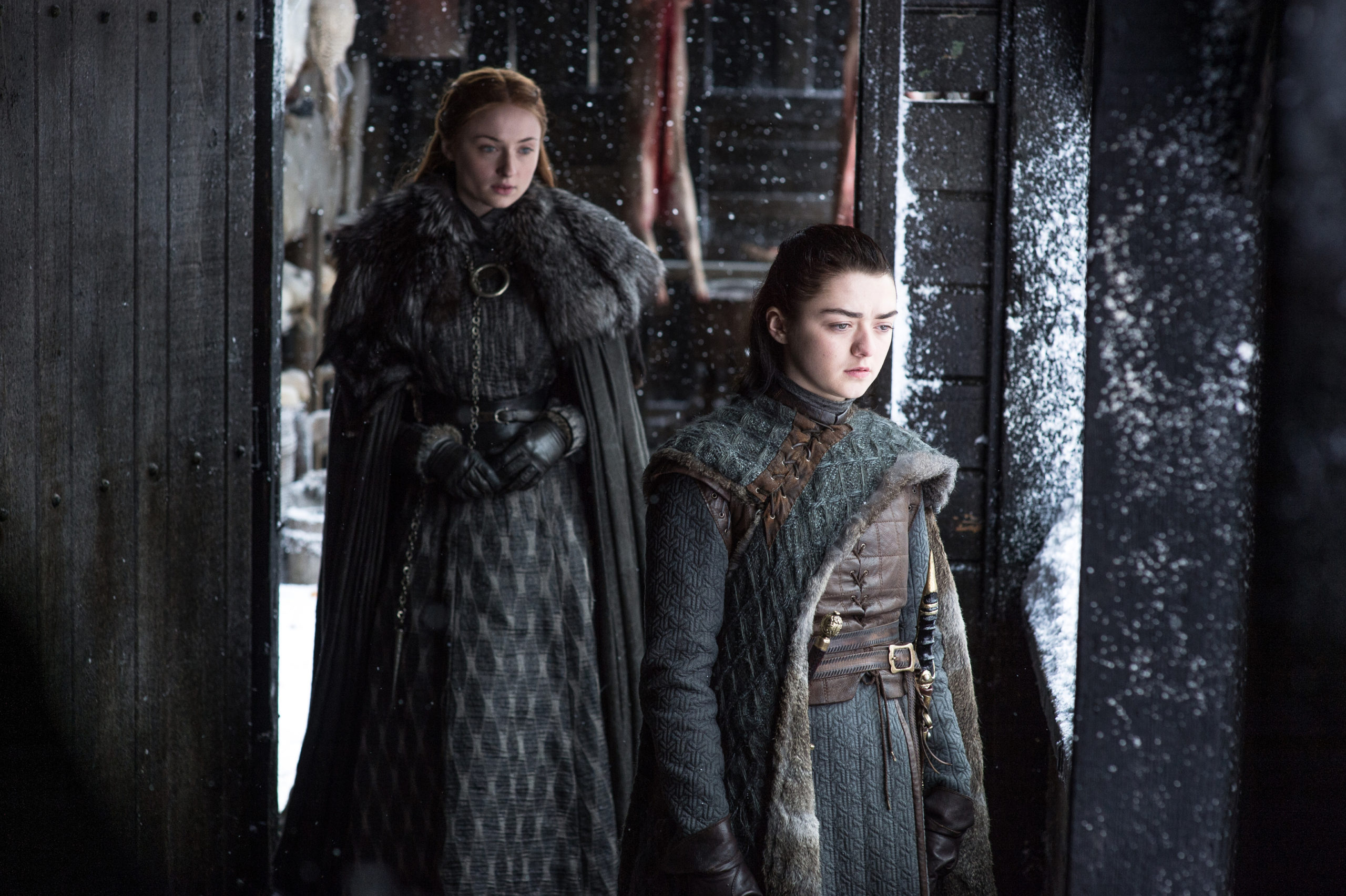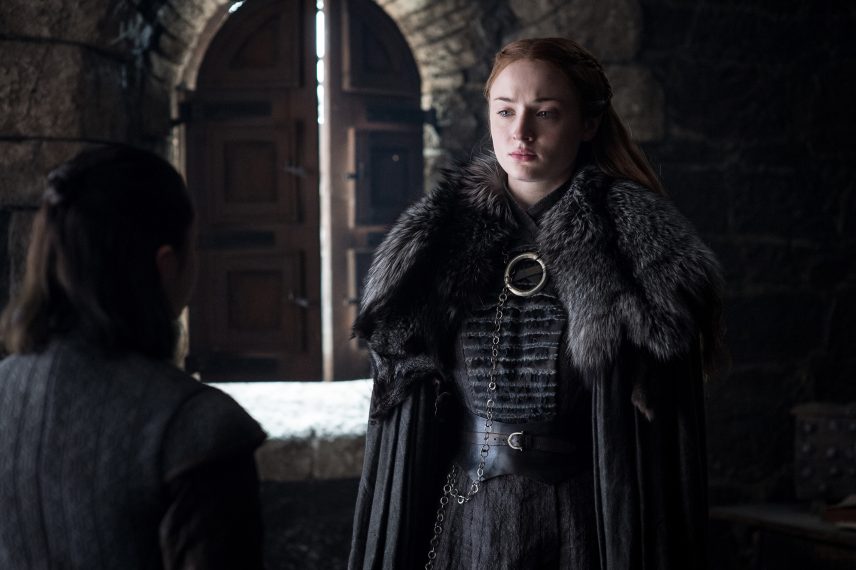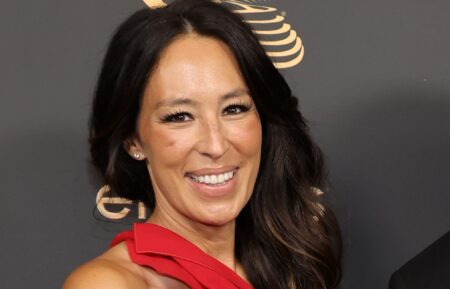Arya vs. Sansa Is Everything That Is Wrong With ‘Game of Thrones’

Opinion
The penultimate episode of each Game of Thrones season is always a highly anticipated, action packed crowd pleaser, but Sunday night’s episode, “Beyond the Wall,” wasn’t exactly the resounding success that “Battle of the Bastards” or “Blackwater” were.
Most critics have focused on the unnecessary, improbable lunacy of Jon Snow (née Targaryen) and company’s zombie hunting mission, but the Arya Stark vs. Sansa Stark subplot is getting its share of backlash as well. As Sarah Mesle argues in the LA Review of Books, the Stark sisters’ rapidly escalating hostility makes sense in the context of their grim, misogynist fantasy world. And that’s just the problem: Sansa and Arya’s enmity makes sense in a narrative in which characters are constantly behaving in counterproductively myopic ways. It’s just one of Game of Thrones’ many problems that are perfectly embodied in the Arya-Sansa feud.
Tension between the sisters has been brewing since Arya showed up at Winterfell to find Sansa leading in Jon’s place, with the duplicitous Littlefinger at her side. Even before life kicked both of their asses, the Stark girls never saw eye to eye.
Arya has always looked down on Sansa for being all about that King’s Landing life, and Sansa couldn’t understand her younger sister’s penchant for swords and shields instead of dresses and needlework. After their initial reunion, in becomes clear that the divide has only deepened. Littlefinger sees this and attempts to exploit it, further isolating Sansa to maintain his influence.
In “Beyond the Wall,” the tension between the sisters turns openly hostile, with Arya all but threatening to kill her sister, and Sansa sending away Brienne, who would presumably stand between the two of them in a grudge match.

It’s a dismaying development for both characters. After all they’ve been through and with enemies to the north and south, both Arya and Sansa should know better than to turn on each other. But here, they have something very much in common with their mother.
In Season 1, Catelyn Stark, believing him responsible for Bran Stark’s attempted murder, took Tyrion Lannister hostage with almost no thought about the consequences. It seemed inevitable, as they traveled to the Vale together, that at some point it would dawn on Catelyn that her prisoner had neither the capacity nor the motivation to murder her crippled, comatose son. She may have had her doubts, but she was too blinded by vengeance, and that moment never really came. That’s just one example of a larger pattern on the show of characters not being able to see the bigger picture, only fighting the battles immediately in front of them.
Now we have Arya and Sansa seemingly oblivious to Littlefinger’s machinations, letting their youthful resentments resurface and distract them from what is really going on. It’s a disappointing turn not just because they seem to be repeating their parents’ mistakes—Sansa in particular has been adamant that she wouldn’t fall into the same traps as her father Ned and brother Robb—but because it does such a disservice to the characters’ journeys.
Both Sansa and Arya’s stories have been about claiming agency. After being brutalized by both Cersei Lannister and Ramsey Bolton, Sansa has finally come into her own as player rather than a pawn in the game of thrones. Meanwhile, Arya has lived through horrors of her own and managed to become the skilled fighter she always dreamed of being. At the beginning of Season 7, it seemed like the Stark sisters had finally become the formidable women we all want to see work together on screen.
And yet, neither seems to be able to see through Littlefinger’s manipulations. The fact that they’re playing right into his hands—and I’m not convinced that they’re just faking him out—robs them of much of their hard won agency. That’s even more dismaying considering the show’s problematic track record with female characters. Is it too much to ask that the show not re-victimize Arya and Sansa by once again making them pawns in the some man’s schemes?
And then there’s the bizarre character assassination the show seems to be engaged in on Arya’s part. When she left the House of Black and White in Season 6, it seemed like she had turned a corner. In reclaiming her identity and returning to Westeros, turning her back on her murder list to return home to Winterfell, it seemed like this season would humanize her, that she would use her combat skills to fight for her family and for humanity. Instead, she seems to have become more of a creepy murder machine than ever.
Sansa, on the other hand, could easily have gone full Cersei after feeding Ramsey Bolton to his own dogs last season. She could have given herself over to the same single-minded vengeance as her mother, Catelyn. Instead, she has become a competent, practical leader in Jon’s absence. Even before her half-brother left her in charge, she’d proved herself a pragmatic strategist, bringing Littlefinger and his forces into the fold not because she liked or trusted him, but because it was what was necessary to take back Winterfell. Sansa is doing the hard, grown-up work of leading, while Arya is just interested in being hard.
Both characters are unquestionably traumatized by what they’ve been through. But Sansa has grown. Arya, on the other hand, has calcified. If she continues down this road, I’m not sure we should be rooting for her anymore.
Part of what makes Game of Thrones so thrilling is its willingness to subvert the fantasy genre. Beloved characters are constantly being killed off and for the most part the show resists fan service. But at a certain point satisfaction has to count for something.
We’ve come a long way with Arya. We’ve spent years assuming that she’s going to become a hero, not a cold blooded assassin. To have her become just another ruthless killer in a world of ruthless killers feels like a betrayal.
For Game of Thrones to be more than just puerile—if riveting—entertainment, it needs to show us that its characters can move beyond the endless cycle of vengeance and intrigue. It needs to show us they can grow.
Between next week’s finale and the six-episode final season, there are roughly seven hours of television left for one of these people to invent democracy. As Tyrion tells Dany, her plan to “break the wheel” probably won’t be achievable in her lifetime, which means Westeros is in all likelihood in for plenty more turmoil even after the final credits roll.
But what Game of Thrones can realistically give us before the series ends is a satisfying conclusion for the characters in whom we’ve invested so much. If Arya and Sansa’s arch this season is any indication, however, I’m not confident that that’s something the show is either interested in or capable of doing.
Game of Thrones, Season 7 Finale, Sunday, 9/8c, HBO
From TV Guide Magazine
Behind the Scenes With Gordon Ramsay: 20 Years of Cooking Up TV Hits
The celebrity chef reflects on redefining culinary television and his fiery journey Hell’s Kitchen to Secret Service. Read the story now on TV Insider.











